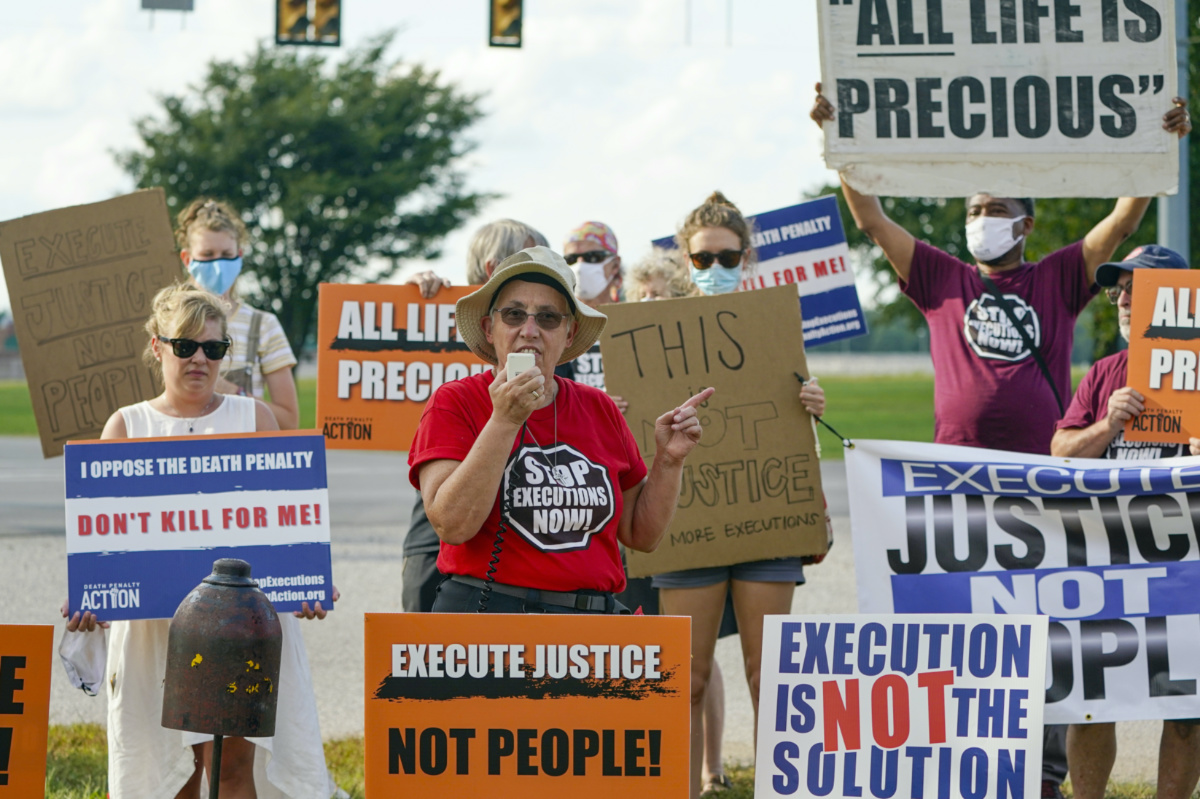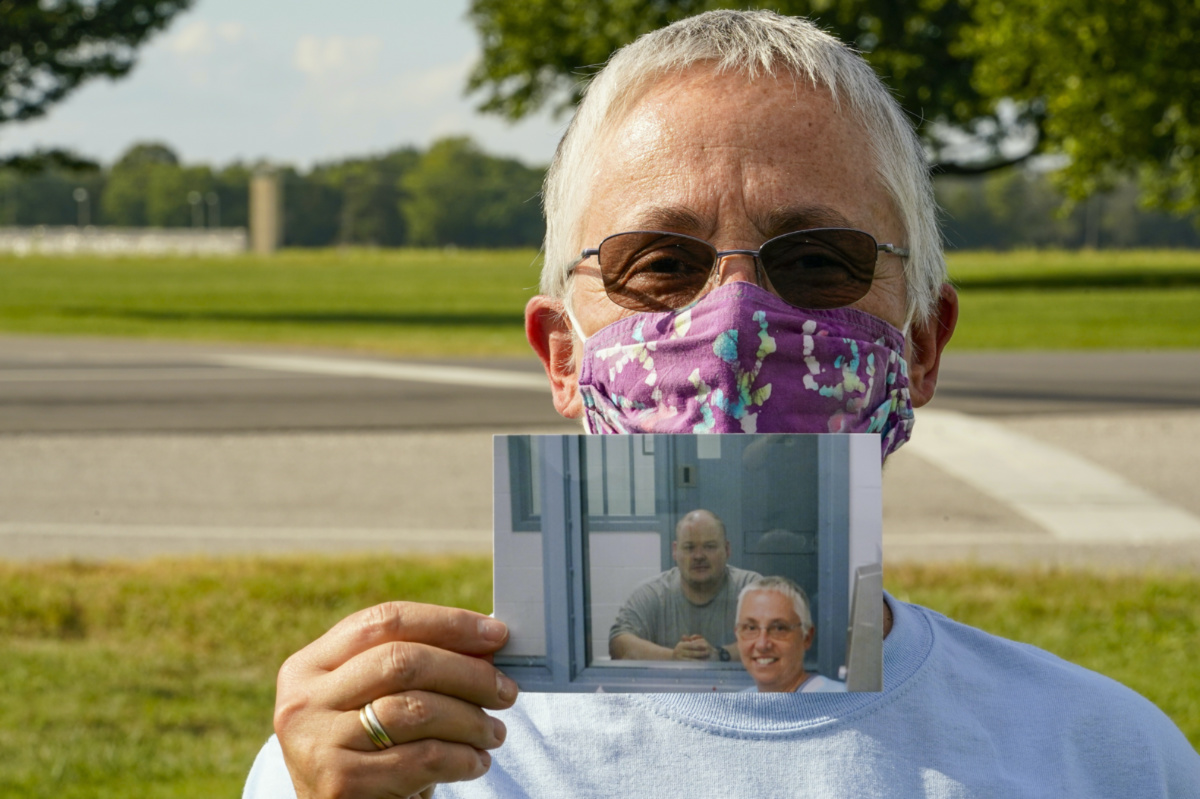
DAVID CRARY, of Associated Press, looks at how people of faith are involved in a bid to overturn a Texas policing banning pastors from praying audibly or laying their hands on the condemned…
New York, US
AP
After Sister Barbara Battista, a Roman Catholic nun staunchly opposed to the death penalty, agreed to accompany a condemned man at his execution in federal prison, she wondered doubtfully, “Am I just part of this whole killing machine?”
“The answer is ‘No,’” she decided, proceeding with her mission to the death chamber in Terre Haute, Indiana, where in August, 2020, Battista said a silent prayer while witnessing the lethal injection of Keith Dwayne Nelson, convicted of kidnapping, sexually assaulting and killing a 10-year-old girl.
“No matter how heinous the act, no matter how much I’m opposed to it, that person deserves to have someone who is there simply because they care,” she said.

In this Wednesday, 26th August, 2020, file photo, Sister Barbara Battista speaks during a protest against the death penalty, across the street from the federal prison complex in Terre Haute, Indiana, before the execution of Lezmond Mitchell, the only Native American on federal death row. PICTURE: AP Photo/Michael Conroy/File photo.
Battista’s name is now on a friend-of-the-court brief submitted to the US Supreme Court by the American Civil Liberties Union. Along with other spiritual advisers and former corrections officials, Battista argues against a Texas policy that prohibits a Southern Baptist pastor from praying aloud and laying hands on a condemned man, John Ramirez, as he is executed.
Ramirez, sentenced to death for the 2004 murder of a convenience store clerk, was scheduled to be executed on 8th September, but the Supreme Court ordered a delay to consider claims that restrictions on the pastor’s role would violate his religious liberties. Oral arguments are scheduled for next Tuesday.
“If the state is going to engage in this practice, it should make every effort to honour the dignity and religious liberties of those it plans to kill.”
– Daniel Mach, director of the ACLU Program on Freedom of Religion and Belief.
The ACLU has a long history of opposing the death penalty and also says that condemned prisoners, even at the moment of execution, have religious rights.
“If the state is going to engage in this practice, it should make every effort to honour the dignity and religious liberties of those it plans to kill,” said Daniel Mach, director of the ACLU Program on Freedom of Religion and Belief
Intriguingly, the ACLU’s position in the Ramirez case is echoed by some conservative religious groups which support the death penalty and are often at odds with the ACLU on other issues, for example in cases where religious conservatives believe they have a right to discriminate against LGBTQ people.
The Southern Baptist Convention has an official position supporting “the fair and equitable use of capital punishment”. Last month the SBC joined six other faith-based groups in a friend-of-the-court brief making the same argument as the ACLU – that Ramirez’s pastor, Dana Moore, should be able to lay hands on him and pray aloud during the execution.
“Religious freedom doesn’t end as you approach the moment of death,” said Brent Leatherwood, acting president of the SBC’s public policy arm. “The state has yet to make a compelling reason for why Pastor Moore cannot minister to Mr Ramirez in these final moments.”
Texas allows spiritual advisers into the execution chamber but bars them from praying audibly or being by the condemned inmate’s side. In its arguments to the Supreme Court, Texas said granting Ramirez’s request would be a step toward enabling federal courts to “micromanage” details of execution protocol.
In some cases, states still employing capital punishment have made adjustments to comply with court orders regarding spiritual advisers.
In February, for example, the Supreme Court blocked Alabama from executing Willie Smith III – convicted of the 1991 abduction and murder of a 22-year-old woman – unless it allowed his personal pastor to be present in the execution chamber. Alabama complied; Smith was executed on 21st October with the pastor, Robert Wiley, by his side.

In this Friday, 28th August, 2020, file photo, Sister Barbara Battista holds a photo – taken during her last visit with Keith Dwayne Nelson – after he was executed at the federal prison complex in Terre Haute, Ind. Battista was Nelson’s spiritual advisor and was present as he was executed. PICTURE: AP Photo/Michael Conroy/File photo.
Efforts to provide condemned prisoners with spiritual comfort at their executions have been ecumenical.
In 2019, the Supreme Court blocked Texas from executing a Buddhist prisoner unless he was allowed to have a Buddhist priest at his side. The same year, the high court allowed Alabama to execute a Muslim inmate, Domineque Ray, even though his spiritual adviser was not allowed to be present; the court said Ray was too late in making his request.
In the past year, Yusuf Nur, a Muslim professor of business who teaches at Indiana University Kokomo, was the spiritual adviser at two federal executions of Muslim inmates. He was present — and permitted to say a traditional Islamic prayer aloud – for the executions of Orlando Hall in November 2020 and Dustin Higgs in January 2021.
“When I first got recruited to talk to a young guy who accepted Islam in prison, I went to see him,” Nur told The Associated Press. “My feeling was that if this person wants somebody to talk to, and the US government is planning to execute him, I’d do whatever I can to contribute so they’re spiritually strong.”
Nur, who opposes capital punishment, said he was moved by the atmosphere in the death chamber for Hall’s execution, given that the others present were “people who came to execute him.”
“To have a friendly face makes a difference to the person being executed,” Nur said. “I’m glad I did it even though it was traumatic to witness a human being killed right in front of your eyes. I would do it again.”
We rely on our readers to fund Sight's work - become a financial supporter today!
For more information, head to our Subscriber's page.
Nur has shared his convictions with Battista, whose order – the Sisters of Providence of Saint Mary-of-the-Woods – is based just 10 miles from the federal prison complex in Terre Haute. All four lethal injections she and Nur attended were part of the federal government’s unprecedented run of 13 executions in six months at the end of the Trump administration.
Currently, Battista, 64, is deeply engaged in anti-racism activities, but she was often on the front line in vigils outside the prison protesting recent federal executions. She’s grateful to have had the opportunity to accompany Nelson and a second condemned man, William Emmett LeCroy, at their executions last year.
“Yes, I had some doubts but I know that through my prayer, my interaction with these men, I was there for them,” she said. “That person deserves to have somebody with them who is the face of love.”
In LeCroy’s case, Battista said he asked her to pray for him, and she informed the executioner that she would be doing so – aloud.
The prayer was the Chaplet of Divine Mercy. Its closing passage includes the words “Eternal God, in whom mercy is endless…look kindly upon us and increase Your mercy in us, that in difficult moments we might not despair nor become despondent.”





